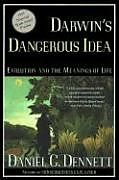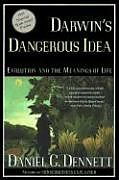Darwin's Dangerous Idea
Einband:
Kartonierter Einband
EAN:
9780684824710
Untertitel:
Evolution and the Meanings of Life
Autor:
Daniel C. Dennett
Herausgeber:
Simon + Schuster LLC
Anzahl Seiten:
586
Erscheinungsdatum:
30.06.1996
ISBN:
068482471X
Zusatztext Jim Holt The Wall Street Journal Dennett is a philosopher of rare originality! rigor! and wit. Here he does one of the things philosophers are supposed to be good at: clearing up conceptual muddles in the sciences. Informationen zum Autor Daniel Dennett is the author of Brainstorms, Elbow Room, and Consciousness Explained. He is currently the Distinguished Arts and Sciences Professor and Director of the Center for Cognitive Studies at Tufts University. He lives in North Andover, Massachusetts, with his wife and has two children. Klappentext Nominated for the 1995 National Book Award for Non-Fiction, this masterly exploration reaffirms the validity of Darwin's theory of natural selection and brilliantly demonstrates its compatibility with free will, sacred beliefs, and the dignity of humankind. Chapter 1 Tell Me Why 1. Is Nothing Sacred? We used to sing a lot when I was a child, around the campfire at summer camp, at school and Sunday school, or gathered around the piano at home. One of my favorite songs was "Tell Me Why." (For those whose personal memories don't already embrace this little treasure, the music is provided in the appendix. The simple melody and easy harmony line are surprisingly beautiful.) Tell me why the stars do shine, Tell me why the ivy twines, Tell me why the sky's so blue. Then I will tell you just why I love you. Because God made the stars to shine, Because God made the ivy twine, Because God made the sky so blue. Because God made you, that's why I love you. This straightforward, sentimental declaration still brings a lump to my throat -- so sweet, so innocent, so reassuring a vision of life! And then along comes Darwin and spoils the picnic. Or does he? That is the topic of this book. From the moment of the publication of Origin of Species in 1859, Charles Darwin's fundamental idea has inspired intense reactions ranging from ferocious condemnation to ecstatic allegiance, sometimes tantamount to religious zeal. Darwin's theory has been abused and misrepresented by friend and foe alike. It has been misappropriated to lend scientific respectability to appalling political and social doctrines. It has been pilloried in caricature by opponents, some of whom would have it compete in our children's schools with "creation science," a pathetic hodgepodge of pious pseudo-science. Almost no one is indifferent to Darwin, and no one should be. The Darwinian theory is a scientific theory, and a great one, but that is not all it is. The creationists who oppose it so bitterly are right about one thing: Darwin's dangerous idea cuts much deeper into the fabric of our most fundamental beliefs than many of its sophisticated apologists have yet admitted, even to themselves. The sweet, simple vision of the song, taken literally, is one that most of us have outgrown, however fondly we may recall it. The kindly God who lovingly fashioned each and every one of us (all creatures great and small) and sprinkled the sky with shining stars for our delight -- that God is, like Santa Claus, a myth of childhood, not anything a sane, undeluded adult could literally believe in. That God must either be turned into a symbol for something less concrete or abandoned altogether. Not all scientists and philosophers are atheists, and many who are believers declare that their idea of God can live in peaceful coexistence with, or even find support from, the Darwinian framework of ideas. Theirs is not an anthropomorphic Handicrafter God, but still a God worthy of worship in their eyes, capable of giving consolation and meaning to their lives. Others ground their highest concerns in entirely secular philosophies, views of the meaning of life that stave oft despair without the aid of any concept of a Supreme Being -- other than the Universe itself....
Jim Holt The Wall Street Journal Dennett is a philosopher of rare originality, rigor, and wit. Here he does one of the things philosophers are supposed to be good at: clearing up conceptual muddles in the sciences.
Autorentext
Daniel Dennett is the author of Brainstorms, Elbow Room, and Consciousness Explained. He is currently the Distinguished Arts and Sciences Professor and Director of the Center for Cognitive Studies at Tufts University. He lives in North Andover, Massachusetts, with his wife and has two children.
Klappentext
Nominated for the 1995 National Book Award for Non-Fiction, this masterly exploration reaffirms the validity of Darwin's theory of natural selection and brilliantly demonstrates its compatibility with free will, sacred beliefs, and the dignity of humankind.
Zusammenfassung
In a book that is both groundbreaking and accessible, Daniel C. Dennett, whom Chet Raymo of The Boston Globe calls "one of the most provocative thinkers on the planet," focuses his unerringly logical mind on the theory of natural selection, showing how Darwin's great idea transforms and illuminates our traditional view of humanity's place in the universe. Dennett vividly describes the theory itself and then extends Darwin's vision with impeccable arguments to their often surprising conclusions, challenging the views of some of the most famous scientists of our day.
Leseprobe
Chapter 1
Tell Me Why
1. Is Nothing Sacred?
We used to sing a lot when I was a child, around the campfire at summer camp, at school and Sunday school, or gathered around the piano at home. One of my favorite songs was "Tell Me Why." (For those whose personal memories don't already embrace this little treasure, the music is provided in the appendix. The simple melody and easy harmony line are surprisingly beautiful.)
Tell me why the stars do shine,
Tell me why the ivy twines,
Tell me why the sky's so blue.
Then I will tell you just why I love you.
Because God made the stars to shine,
Because God made the ivy twine,
Because God made the sky so blue.
Because God made you, that's why I love you.
This straightforward, sentimental declaration still brings a lump to my throat -- so sweet, so innocent, so reassuring a vision of life!
And then along comes Darwin and spoils the picnic. Or does he? That is the topic of this book. From the moment of the publication of Origin of Species in 1859, Charles Darwin's fundamental idea has inspired intense reactions ranging from ferocious condemnation to ecstatic allegiance, sometimes tantamount to religious zeal. Darwin's theory has been abused and misrepresented by friend and foe alike. It has been misappropriated to lend scientific respectability to appalling political and social doctrines. It has been pilloried in caricature by opponents, some of whom would have it compete in our children's schools with "creation science," a pathetic hodgepodge of pious pseudo-science.
Almost no one is indifferent to Darwin, and no one should be. The Darwinian theory is a scientific theory, and a great one, but that is not all it is. The creationists who oppose it so bitterly are right about one thing: Darwin's dangerous idea cuts much deeper into the fabric of our most fundamental beliefs than many of its sophisticated apologists have yet admitted, even to themselves.
The sweet, simple vision of the song, taken literally, is one that most of us have outgrown, however fondly we may recall it. The kindly God who lovingly fashioned each and every one of us (all creatures great and small) and sprinkled the sky with shining stars for our delight -- that God is, like Santa Claus, a myth of childhood, not anything a sane, undeluded adult could literally believe in. That God must either be turned into a symbol for something less concrete or abandoned altogether.
Not all scientists and philosophers are atheists, and many who are believers declare that thei…

Leider konnten wir für diesen Artikel keine Preise ermitteln ...
billigbuch.ch sucht jetzt für Sie die besten Angebote ...
Die aktuellen Verkaufspreise von 6 Onlineshops werden in Realtime abgefragt.
Sie können das gewünschte Produkt anschliessend direkt beim Anbieter Ihrer Wahl bestellen.
Loading...
Die aktuellen Verkaufspreise von 6 Onlineshops werden in Realtime abgefragt.
Sie können das gewünschte Produkt anschliessend direkt beim Anbieter Ihrer Wahl bestellen.
| # | Onlineshop | Preis CHF | Versand CHF | Total CHF | ||
|---|---|---|---|---|---|---|
| 1 | Seller | 0.00 | 0.00 | 0.00 |
